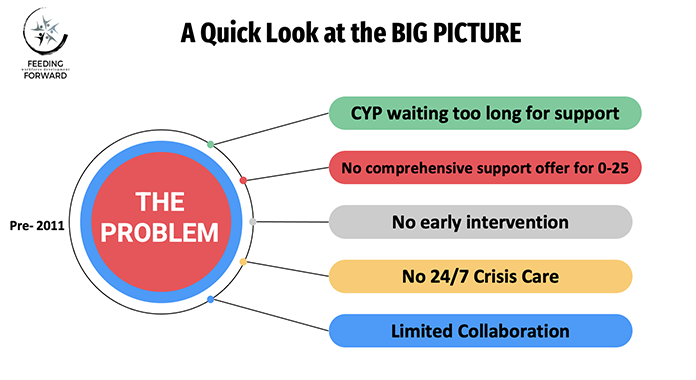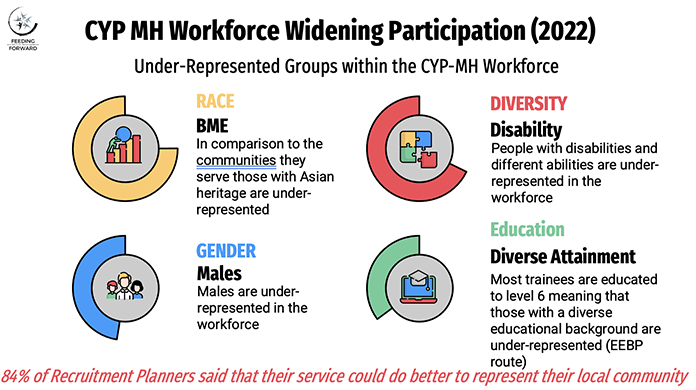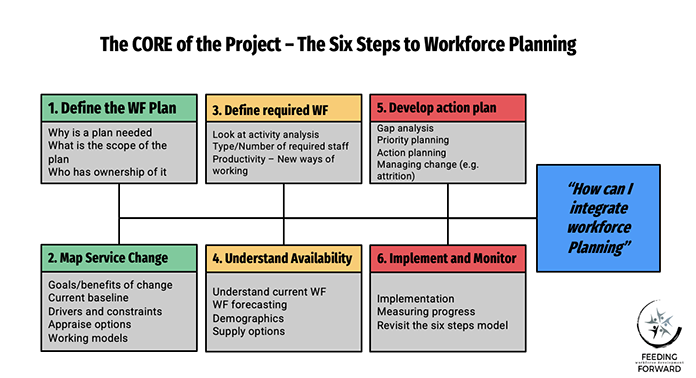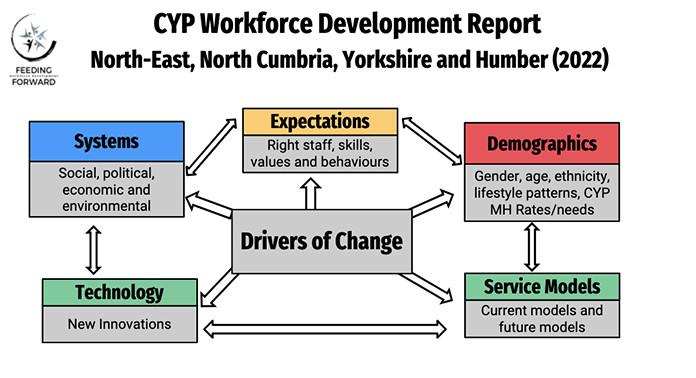
We have launched a new webinar series designed to address the most pressing operational challenges in mental health services.
Staff retention and workforce planning are among the top operational challenges faced by mental health services in the UK today. The pressure of high turnover rates and workforce shortages continues to affect service quality and staff wellbeing.
We welcomed guest speakers, Nathalie Dullage, Workforce Development Project Manager at Northumbria University, and Hayley Savage, Strategic Workforce Manager, Mental Health Trusts in North East and Cumbria. They shared insights into the Feeding Forward project, an initiative that promotes a proactive, evidence-based approach to making workforce planning more accessible and effective.
The project focuses specifically on the challenges faced by the workforce in children’s mental health services. Feeding Forward is a collaborative effort involving Northumbria University, the Northeast and Yorkshire Collaborative, NHS and VCSO partners, and the Psychological Professions Network.
Watch the recording on-demand here.
Find out how iaptus supports workforce planning here.
The Feeding Forward project supports service level workforce planners to develop a proactive, long term, sustainable approach. The key project deliverables were:
- Guidance on data
- Accessible and evidence based framework
- Interactive audit tool identifying workforce planning drivers and constraints
- Toolbox of tangible resources for workforce development planning
The bigger picture
It is crucial to consider the broader context when addressing workforce challenges. Prior to 2011, children’s mental health services faced significant difficulties, including long wait times for support and a notable lack of available services. The CYP IAPT transformation project proved to be an effective solution. It enhanced access to services, reduced waiting times, and fostered greater collaboration across the sector.

Workforce challenges
Despite improvements, CYPMH services still face ongoing difficulties, especially in staff retention and recruiting skilled professionals. Since December 2019, the MHST workforce has grown exponentially, now representing 10% of the overall CYPMH workforce. However, several challenges must be addressed in workforce strategies, including:
- Lengthy and costly training requirements, along with restrictive training windows, can create significant bottlenecks.
- MHST retention rates are lower than those for the broader mental health workforce, with some staff (particularly EMHPs and CWPs) viewing these roles as stepping stones to other positions. This suggests a need to improve the recruitment process, and for proactive measures to be implemented to help services better manage these transitions.
- Career progression is essential, and staff need clear pathways for advancement. This can be supported through clinical supervision by experienced practitioners. Opportunities for staff to develop their own skills and clinical expertise are also crucial.
The workforce is also not as representative as it could be in terms of gender, race, diversity and education.

Considerations for workforce planning
The initial phase of the Feeding Forward project focused on identifying the need for a more structured approach. Research indicates that a standardised workforce strategy is lacking, with several key issues identified:
- Fragmented responsibility – a lack of a coherent approach, lack of clarity around how to plan effectively
- Lack of clarity to focus on workforce planning
- Lack of understanding on what is involved within workforce planning
- A clear service level support gap – resources are mostly aimed at system level rather than service level workforce planners.
Core of the project
The second stage of the project focused on identifying existing support and resources, and transforming them into practical, actionable tools. The Feeding Forward project was designed around a freely accessible model – the Six Steps to Workforce Planning, which served as the foundation. This approach allows the toolbox to evolve in response to the factors outlined in the model. By following this process, services can better meet the needs of CYP while exploring new and more efficient ways of working. To implement this within your service, you should:
- Define the plan – think about what problems you are solving. What staff and areas are covered by the plan? Who is responsible?
- Map service change – what are the goals and benefits for bringing change? What factors will drive or constrain your workforce planning? Think about political, economic, social and technological factors.
- Define your required workforce – are there new ways of working you could consider? What activities need to be completed and who do you need to achieve that?
- Understand your workforce availability – consider options for staff retention and retraining.
- Develop an action plan – use steps 1- 4. You could complete skills gap analysis, priority planning and consider how you can anticipate change.
- Implement and monitor your plans and adjust accordingly.
The framework needed to address key areas such as improving recruitment, leadership, staff retention, and addressing skills gaps. Multiple drivers of change are at play in this context. While the service model is a critical component, it represents only part of the broader picture.

Workforce planning toolbox contents
As part of the Feeding Forward project, a comprehensive workforce planning toolbox has been created. This guides services through the 6 steps model, enabling them to co create a sustainable 3 year workforce plan. This allows you to:
- Complete a skills gap analysis to support you in steering staff training needs
- Incorporate positive recruitment strategies which help you recruit a more diverse team
- Recognise career pathways for those who work in children’s psychological services – helping them to understand that they aren’t in a stepping stone role.
- Provide ‘get into’ resources which can support school leavers or those who want a career change to access a career in children’s mental health services.
Get in touch
If you would like to be a guest speaker at one of our next operational challenges webinars, or have a topic that you would like us to cover, please email events@mayden.co.uk. You can also find more resources and access previous webinars on our Mayden Hub.
To learn how iaptus can help solve operational challenges, book a demo with our product experts.
